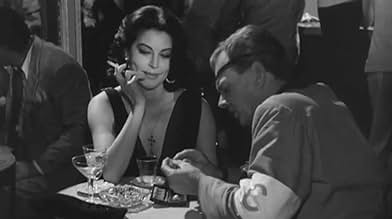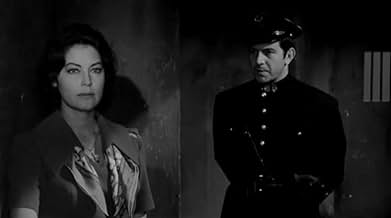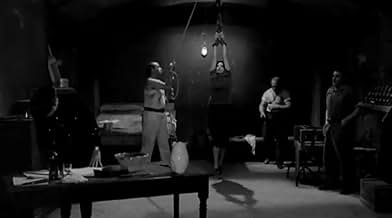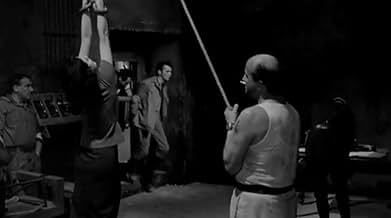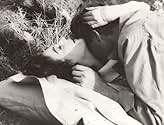VALUTAZIONE IMDb
5,8/10
912
LA TUA VALUTAZIONE
Aggiungi una trama nella tua linguaFather Arturo Carrera leaves the priesthood over the church's indifferent position during the Spanish Civil War, but finds himself attracted to beautiful entertainer Soledad.Father Arturo Carrera leaves the priesthood over the church's indifferent position during the Spanish Civil War, but finds himself attracted to beautiful entertainer Soledad.Father Arturo Carrera leaves the priesthood over the church's indifferent position during the Spanish Civil War, but finds himself attracted to beautiful entertainer Soledad.
- Regia
- Sceneggiatura
- Star
Robert Bright
- Father Idelfonso
- (non citato nei titoli originali)
Franco Castellani
- José
- (non citato nei titoli originali)
Nino Castelnuovo
- Capt. Trinidad
- (non citato nei titoli originali)
Robert Cunningham
- Mac
- (non citato nei titoli originali)
Gustavo De Nardo
- Maj. Garcia
- (non citato nei titoli originali)
Franco Fantasia
- Cabaret Customer
- (non citato nei titoli originali)
Armando Fracassi
- Nationalist Prisoner
- (non citato nei titoli originali)
Recensioni in evidenza
There's an interesting story here on a number of levels but at roughly 1:40 minutes there's not enough time to tell them all well, which it tries to do. Really didn't understand the point of Joseph Cotten's journalist, even as an expository device. I'll leave criticisms or praise of the treatment of the civil war to others with more than the passing knowledge I have. Someone noted the cramped and dark cinematography, which worked for some scenes but not what might have been some of the more grand-scale scenes, which looked like they were cropped or framed so as not to admit incongruous sites or things into the shots. The lovers are a bit too aware of their fate it seems for them to have a realistic relationship. This one's OK for a watch but for characters bound up in a tragic relationship during revolution and civil war, it is no Dr. Zhivago.
Dirk Bogarde was an amazingly talented actor--so much so that I specifically look for his films. However, despite MANY great films, he occasionally made a stinker...and "The Angel Wore Red" is one of them. The movie lost money and I can see exactly why.
The story is set just before the first days of the Spanish Civil War in 1936. Arturo (Bogarde) is a priest serving in Spain and he's disenchanted with the Church. He is so disenchanted that he leaves the priesthood. However, his timing sucks...as the Civil War breaks out and priests are being rounded up and shot! The new Socialist/Communist backed Republicans blame the Church for supporting the Nationalists....and folks are taking retribution of the priests, as they are in a Republican stronghold. Now Arturo has to flee for his life...as folks THINK he's still a priest.
During his time on the run, Arturo is aided by a 'girl of easy virtue' (Ava Gardner) and, inexplicably, the pair fall in love. Now this really does NOT make any sense and it happens way too quickly to be believable. To make it worse, often the film lets the pair just talk and talk and talk....and it's all quite sticky and sappy.
Later, Arturo is caught by the Republicans. They would rather not kill him, since they learned he left the priesthood, but instead of releasing him they force him to work with him. His unenviable task is to take confessions from the priests they are about to execute!! What's next for him and his new main squeeze?
Despite the story seeming rather anti-clerical and having a love affair between an ex-priest and 'good time girl' may seem very anti-clerical, the film actually takes a rather neutral view overall. Unlike many movies of the 1940s that were decidedly pro-Republic, this one shows the Republic a little more realistically...and the film hedges its bets by having Arturo learn to once again love the Church. Considering the Republicans were backed by Stalin and the Nationalists backed by Hitler, it wasn't exactly a war where one side was 'the good guy' and the other 'evil'....and the movie at least gets this part of the story right. Unfortunately, the love affair is unconvincing and the dialog silly and trite. Too bad...as Bogarde was simply better than the material they gave him.
The story is set just before the first days of the Spanish Civil War in 1936. Arturo (Bogarde) is a priest serving in Spain and he's disenchanted with the Church. He is so disenchanted that he leaves the priesthood. However, his timing sucks...as the Civil War breaks out and priests are being rounded up and shot! The new Socialist/Communist backed Republicans blame the Church for supporting the Nationalists....and folks are taking retribution of the priests, as they are in a Republican stronghold. Now Arturo has to flee for his life...as folks THINK he's still a priest.
During his time on the run, Arturo is aided by a 'girl of easy virtue' (Ava Gardner) and, inexplicably, the pair fall in love. Now this really does NOT make any sense and it happens way too quickly to be believable. To make it worse, often the film lets the pair just talk and talk and talk....and it's all quite sticky and sappy.
Later, Arturo is caught by the Republicans. They would rather not kill him, since they learned he left the priesthood, but instead of releasing him they force him to work with him. His unenviable task is to take confessions from the priests they are about to execute!! What's next for him and his new main squeeze?
Despite the story seeming rather anti-clerical and having a love affair between an ex-priest and 'good time girl' may seem very anti-clerical, the film actually takes a rather neutral view overall. Unlike many movies of the 1940s that were decidedly pro-Republic, this one shows the Republic a little more realistically...and the film hedges its bets by having Arturo learn to once again love the Church. Considering the Republicans were backed by Stalin and the Nationalists backed by Hitler, it wasn't exactly a war where one side was 'the good guy' and the other 'evil'....and the movie at least gets this part of the story right. Unfortunately, the love affair is unconvincing and the dialog silly and trite. Too bad...as Bogarde was simply better than the material they gave him.
Though far from perfect, I could watch this movie again, and perhaps even more than that. It's a fascinating movie, for one thing, pairing two of the most beautiful people who ever lived, in a story with real depth, or at least the promise of real depth, which says a lot in a world where 99 movies out of 100 don't even try. Imagine, complaining that at 37, Ava Gardner was "past her prime." It is wonderful to see Bogarde, whose roles usually had him sneering worldly-wise ironies, showing heartfelt passion for the good and the true. It is equally wonderful to see Gardner in a role far more suited for her than the calculating charmer or the tormented playgirl. She never seemed to be really trying until this one, where perhaps the part touched something deep in her. Their chemistry was superlative, their love scene one of the greats of all time, in my view.
That this portrayal of a love that goes beyond time and place occurs in the context of one of the most astonishingly wicked and absurd wars of all time is another sublimity that seems to have whizzed right by all but one of the previous reviewers. Hemingway showed only that Robert Jordan thought the war was absurd, he didn't show its absurdity, which director Nunnally Johnson managed to do here in both direction and dialog, and against great odds. Like another of my favorites, Viva Zapata, this movie is a flawed masterpiece, better by far than 100 polished banalities. Blame its flaws on the trials of filming in 1960 (still stuck in the 50s), on sloppy editing, on the meaningless title, and the inevitable hurdles that writers and directors have to overcome in the complicated and difficult art of film-making, truly daunting in the case of this film. (Imagine attempting to film a love story between a priest and a prostitute in 50s Sicily?!) Don't blame the the actors, the director, or the beautiful and poignant story.
That this portrayal of a love that goes beyond time and place occurs in the context of one of the most astonishingly wicked and absurd wars of all time is another sublimity that seems to have whizzed right by all but one of the previous reviewers. Hemingway showed only that Robert Jordan thought the war was absurd, he didn't show its absurdity, which director Nunnally Johnson managed to do here in both direction and dialog, and against great odds. Like another of my favorites, Viva Zapata, this movie is a flawed masterpiece, better by far than 100 polished banalities. Blame its flaws on the trials of filming in 1960 (still stuck in the 50s), on sloppy editing, on the meaningless title, and the inevitable hurdles that writers and directors have to overcome in the complicated and difficult art of film-making, truly daunting in the case of this film. (Imagine attempting to film a love story between a priest and a prostitute in 50s Sicily?!) Don't blame the the actors, the director, or the beautiful and poignant story.
A fairly potent script with an interesting plot device at its core (both believers and non-believers alike chase after a sacred religious relic during a bloody civil war), undermined by rather bland, pedestrian film-making. Thus, it's not terribly surprising this was the last film directed by the prolific screenwriter Nunnally Johnson. He shoots just about everything in an overly dark and cramped way making it often impossible to determine where a scene is set, let alone what is going on or even who is in it. This may have been intentional, with the absence of light meant to convey the spiritual darkness in which the country of Spain was submerged at the time, but it comes off as crude and makes for rough viewing. There's something strange about the sound as well; there are few if any sufficiently lit close ups and it seems as if some of the actors' voices have been dubbed. Vittorio DeSica's character, for instance, comes across a bit like Truman Capote playing General Patton. Joseph Cotten pops up every now and again, as a cynical, gravel-voiced newsman, (in fact, he also narrates) but you never ever really see his face and there is something disembodied about his entire presence. It's all a bit unsettling.
Nonetheless, if you can endure its flaws, the movie raises some thought provoking questions on the nature of faith and religion in times of strife, and Dirk Bogarde is quite impassioned as the troubled priest. Ava Gardner, however, is noticeably past her prime as Bogarde's love interest, and her character isn't adequately fleshed out.
Nonetheless, if you can endure its flaws, the movie raises some thought provoking questions on the nature of faith and religion in times of strife, and Dirk Bogarde is quite impassioned as the troubled priest. Ava Gardner, however, is noticeably past her prime as Bogarde's love interest, and her character isn't adequately fleshed out.
I thought this film was rather lacking in both narrative and film-making technique. The script is far from awful, but also far from interesting in the most part. As the previous reviewer says, the lighting, choice of shots etc. was jarring and obscured characters (Joseph Cotten, who indeed established no presence at all in this film partly due to this). The historical period examined is a curious if comendable choice, and while the general details are correctly conveyed, no attempt is really made to discuss the issues in much depth. Good to see neither of the two sides particularly favoured, although such a commitment might have added at least some drama. Drama is scant in the film, with a few scenes written as exposition, delivered in a way just as stilted.
The film actually has a rather good and eclectic cast for 1960, although the talents are ill used. Finlay Currie, Vittorio De Sica (well, seemingly in the main part a director), Dirk Bogarde (not yet of the stature achieved in films like "The Servant" and "Accident"), Joseph Cotten and Ava Gardner are all of some talent. De Sica's character who does indeed speak in a rather un-Italian, mid-Atlantic accent, which either suggests dubbing or a remarkably odd decision somewhere along the line - the character is portrayed as a Spanish patriot. The character's endless minor disparaging comments about modern warfare are mildly amusing in their frequency. I wouldn't say Ava Gardner is at all "past her prime" in this film, at about 37. Her performance is actually quite good, although lacking some credibility, and there are some pretty reasonable quiet scenes between her and Bogarde. Her beauty seems to have matured well, although the murky, technically below-par direction doesn't help this to show. Bogarde seemed quite good at times, but far from indelible or memorable in this role.
I would say this film is reasonably watchable and far from abject, but it is largely far from gripping or interesting.
Rating:- **/*****
The film actually has a rather good and eclectic cast for 1960, although the talents are ill used. Finlay Currie, Vittorio De Sica (well, seemingly in the main part a director), Dirk Bogarde (not yet of the stature achieved in films like "The Servant" and "Accident"), Joseph Cotten and Ava Gardner are all of some talent. De Sica's character who does indeed speak in a rather un-Italian, mid-Atlantic accent, which either suggests dubbing or a remarkably odd decision somewhere along the line - the character is portrayed as a Spanish patriot. The character's endless minor disparaging comments about modern warfare are mildly amusing in their frequency. I wouldn't say Ava Gardner is at all "past her prime" in this film, at about 37. Her performance is actually quite good, although lacking some credibility, and there are some pretty reasonable quiet scenes between her and Bogarde. Her beauty seems to have matured well, although the murky, technically below-par direction doesn't help this to show. Bogarde seemed quite good at times, but far from indelible or memorable in this role.
I would say this film is reasonably watchable and far from abject, but it is largely far from gripping or interesting.
Rating:- **/*****
Lo sapevi?
- QuizThe film was originally planned to be shot on-location in Spain. However, due to the unflattering portrayal of Nationalists in the Spanish Civil War, the Franco regime declined permission.
- BlooperWhen the prisoners are being marched for several days to be presented to the fascists, the group contains a substantial number of women. At least two women are shown confessing to Arturo. But when the fascists capture the group, Arturo tells the commander that the group consists of 200 men who should not be killed, no mention of women. When Arturo enters the church to tell the prisoners they are to be executed, the group is all men. The women have vanished.
- ConnessioniFeatured in Best in Action: 1960 (2018)
I più visti
Accedi per valutare e creare un elenco di titoli salvati per ottenere consigli personalizzati
- How long is The Angel Wore Red?Powered by Alexa
Dettagli
Botteghino
- Budget
- 1.843.000 USD (previsto)
- Tempo di esecuzione1 ora 35 minuti
- Colore
- Proporzioni
- 1.85 : 1
Contribuisci a questa pagina
Suggerisci una modifica o aggiungi i contenuti mancanti

Divario superiore
By what name was La sposa bella (1960) officially released in India in English?
Rispondi

